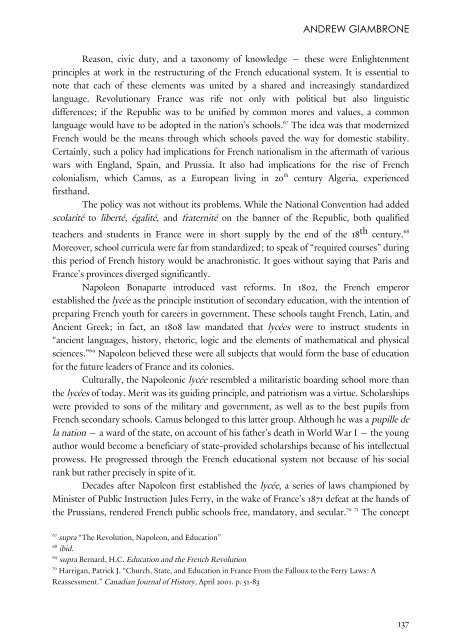The Stranger Or the Boy from Belcourt
The Stranger Or the Boy from Belcourt
The Stranger Or the Boy from Belcourt
- No tags were found...
Create successful ePaper yourself
Turn your PDF publications into a flip-book with our unique Google optimized e-Paper software.
ANDREW GIAMBRONEReason, civic duty, and a taxonomy of knowledge — <strong>the</strong>se were Enlightenmentprinciples at work in <strong>the</strong> restructuring of <strong>the</strong> French educational system. It is essential tonote that each of <strong>the</strong>se elements was united by a shared and increasingly standardizedlanguage. Revolutionary France was rife not only with political but also linguisticdifferences; if <strong>the</strong> Republic was to be unified by common mores and values, a commonlanguage would have to be adopted in <strong>the</strong> nation’s schools. 67 <strong>The</strong> idea was that modernizedFrench would be <strong>the</strong> means through which schools paved <strong>the</strong> way for domestic stability.Certainly, such a policy had implications for French nationalism in <strong>the</strong> aftermath of variouswars with England, Spain, and Prussia. It also had implications for <strong>the</strong> rise of Frenchcolonialism, which Camus, as a European living in 20 th century Algeria, experiencedfirsthand.<strong>The</strong> policy was not without its problems. While <strong>the</strong> National Convention had addedscolarité to liberté, égalité, and fraternité on <strong>the</strong> banner of <strong>the</strong> Republic, both qualifiedteachers and students in France were in short supply by <strong>the</strong> end of <strong>the</strong> 18 th century. 68Moreover, school curricula were far <strong>from</strong> standardized; to speak of “required courses” duringthis period of French history would be anachronistic. It goes without saying that Paris andFrance’s provinces diverged significantly.Napoleon Bonaparte introduced vast reforms. In 1802, <strong>the</strong> French emperorestablished <strong>the</strong> lycée as <strong>the</strong> principle institution of secondary education, with <strong>the</strong> intention ofpreparing French youth for careers in government. <strong>The</strong>se schools taught French, Latin, andAncient Greek; in fact, an 1808 law mandated that lycées were to instruct students in“ancient languages, history, rhetoric, logic and <strong>the</strong> elements of ma<strong>the</strong>matical and physicalsciences.” 69 Napoleon believed <strong>the</strong>se were all subjects that would form <strong>the</strong> base of educationfor <strong>the</strong> future leaders of France and its colonies.Culturally, <strong>the</strong> Napoleonic lycée resembled a militaristic boarding school more than<strong>the</strong> lycées of today. Merit was its guiding principle, and patriotism was a virtue. Scholarshipswere provided to sons of <strong>the</strong> military and government, as well as to <strong>the</strong> best pupils <strong>from</strong>French secondary schools. Camus belonged to this latter group. Although he was a pupille dela nation — a ward of <strong>the</strong> state, on account of his fa<strong>the</strong>r’s death in World War I — <strong>the</strong> youngauthor would become a beneficiary of state-provided scholarships because of his intellectualprowess. He progressed through <strong>the</strong> French educational system not because of his socialrank but ra<strong>the</strong>r precisely in spite of it.Decades after Napoleon first established <strong>the</strong> lycée, a series of laws championed byMinister of Public Instruction Jules Ferry, in <strong>the</strong> wake of France’s 1871 defeat at <strong>the</strong> hands of<strong>the</strong> Prussians, rendered French public schools free, mandatory, and secular. 70 71 <strong>The</strong> concept67supra “<strong>The</strong> Revolution, Napoleon, and Education”68ibid.69supra Bernard, H.C. Education and <strong>the</strong> French Revolution70 Harrigan, Patrick J. “Church, State, and Education in France From <strong>the</strong> Falloux to <strong>the</strong> Ferry Laws: AReassessment.” Canadian Journal of History, April 2001. p. 51-83137


